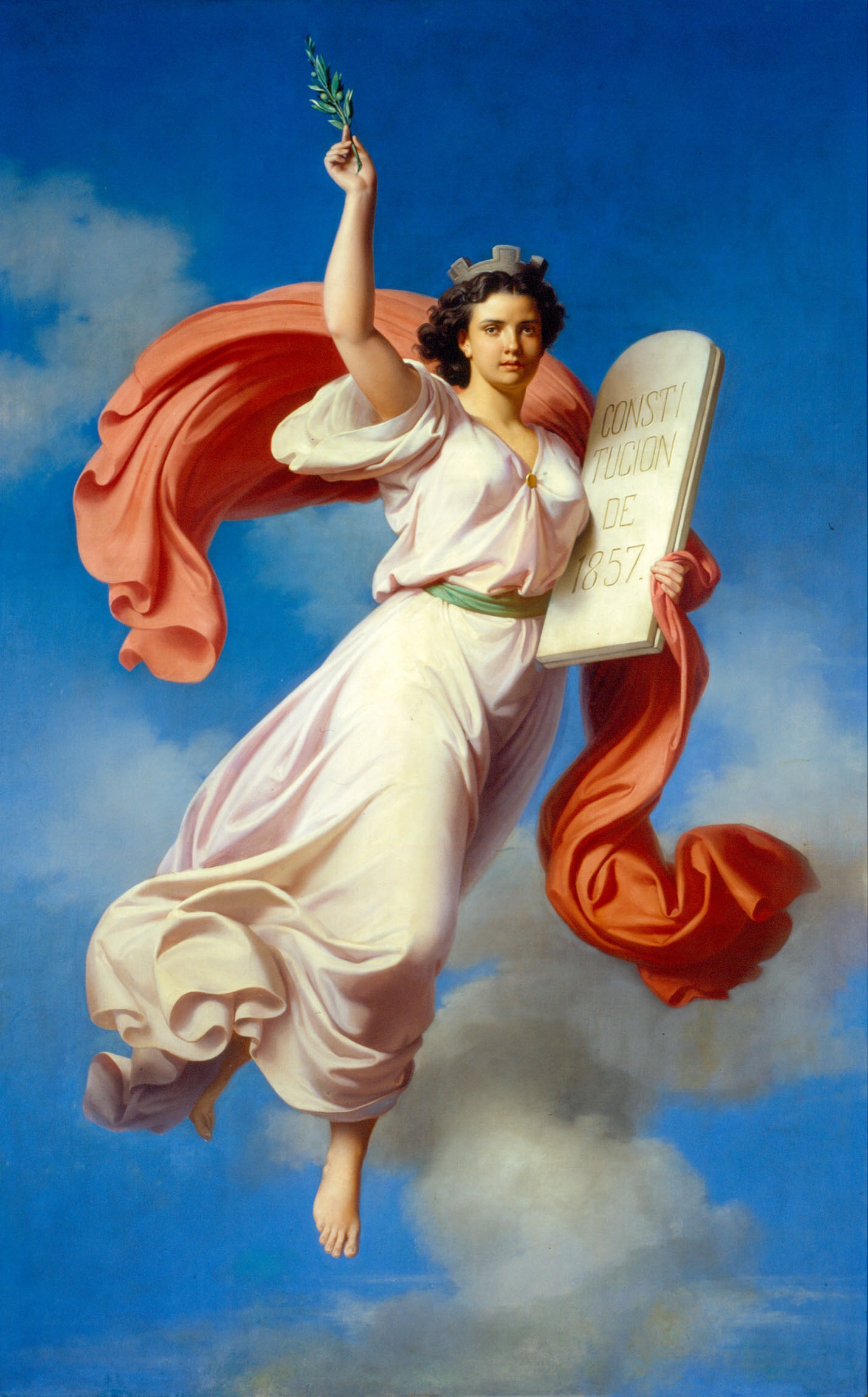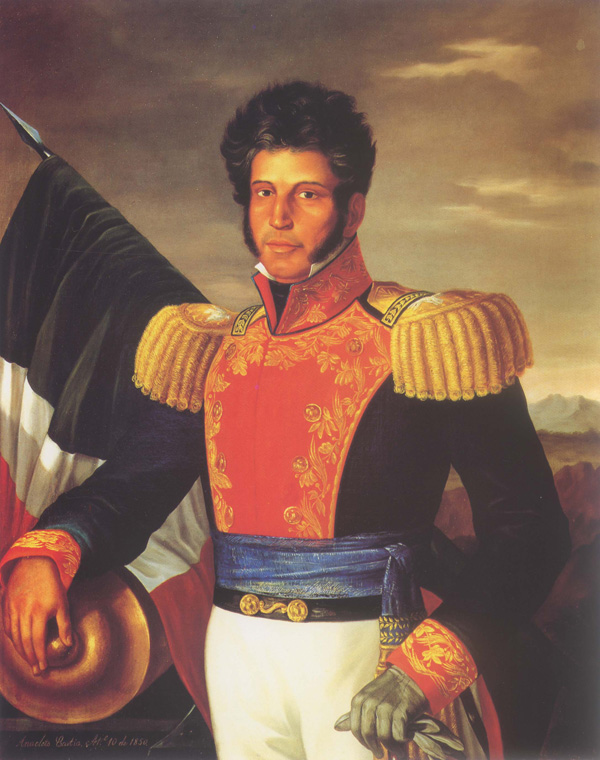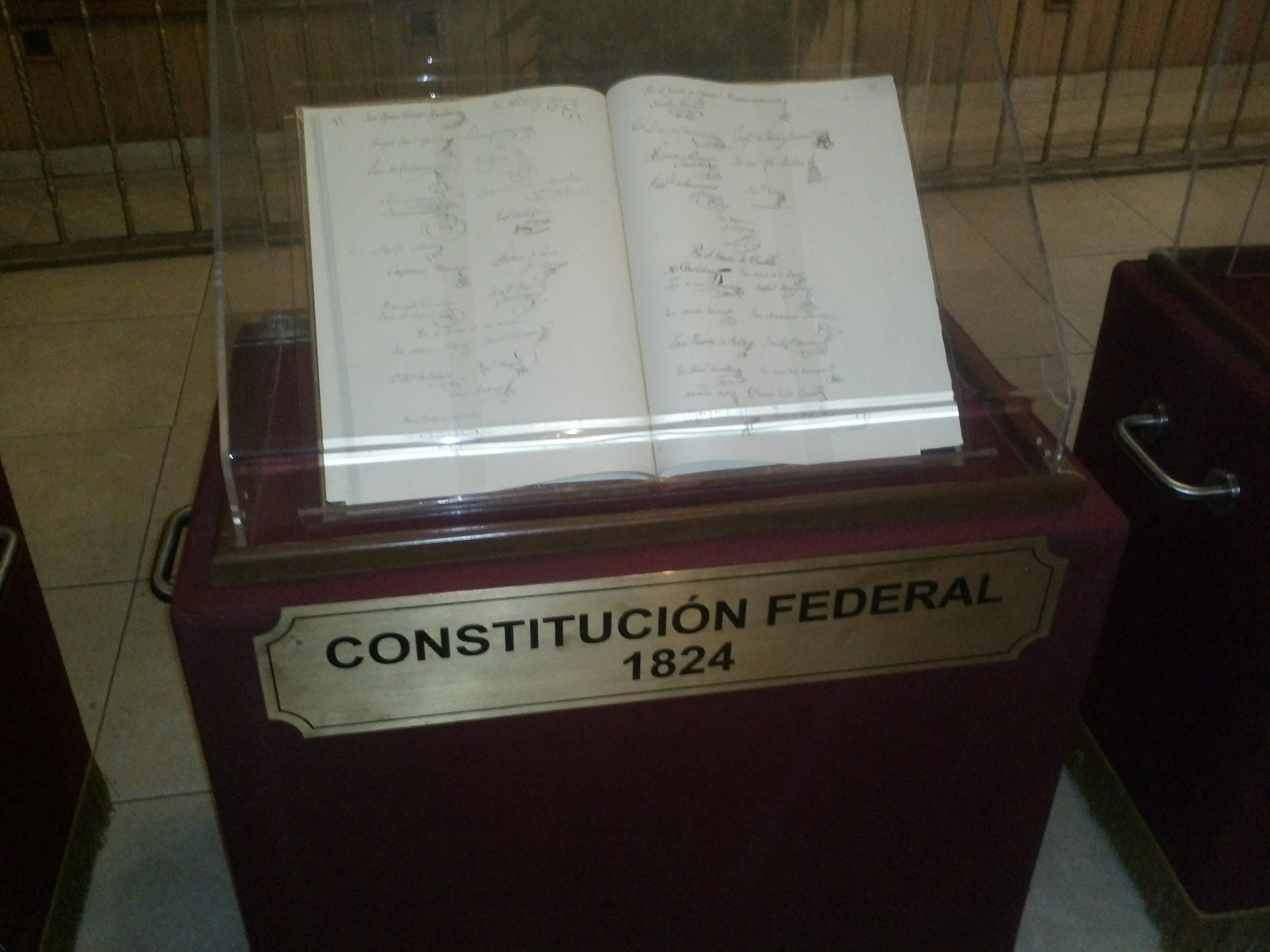|
José María Luis Mora
José María Luis Mora Lamadrid (12 October 1794, Chamacuero, Guanajuato – 14 July 1850, Paris, France) was a priest, lawyer, historian, politician and liberal ideologist. Considered one of the first supporters of liberalism in Mexico, he fought for the separation of church and state. Mora has been deemed "the most significant liberal spokesman for his generation ndhis thought epitomizes the structure and the predominant orientation of Mexican liberalism." Early life Born in 1794 during Spanish colonial rule of Mexico, Mora came from a prosperous American-born Spanish (''criollo'') family from the Guanajuato. His family lost its wealth during the 1810 revolt of Father Miguel Hidalgo, but Mora gained access to the prestigious ex-Jesuit academy of Colegio de San Ildefonso in Mexico City, where he studied theology. In 1820 he received his doctorate and ordination to the priesthood. He was a faculty member at the colegio and also served as librarian. He became a deacon in the ... [...More Info...] [...Related Items...] OR: [Wikipedia] [Google] [Baidu] |
State Of Mexico
The State of Mexico ( es, Estado de México; ), officially just Mexico ( es, México), is one of the 32 federal entities of the United Mexican States. Commonly known as Edomex (from ) to distinguish it from the name of the whole country, it is the most populous, as well as the most densely populated, state in the country. Located in South-Central Mexico, the state is divided into 125 municipalities. The state capital city is Toluca de Lerdo ("Toluca"), while its largest city is Ecatepec de Morelos ("Ecatepec"). The State of Mexico surrounds Mexico City on three sides and borders the states of Querétaro and Hidalgo to the north, Morelos and Guerrero to the south, Michoacán to the west, and Tlaxcala and Puebla to the east. The territory that now comprises the State of Mexico once formed the core of the Pre-Hispanic Aztec Empire. During the Spanish colonial period, the region was incorporated into New Spain. After gaining independence in the 19th century, Mexico City w ... [...More Info...] [...Related Items...] OR: [Wikipedia] [Google] [Baidu] |
Liberalism In Mexico
Liberalism in Mexico was part of a broader nineteenth-century political trend affecting Western Europe and the Americas, including the United States, that challenged entrenched power. In Mexico, liberalism sought to make fundamental the equality of individuals before the law, rather than their benefiting from special privileges of corporate entities, especially the Roman Catholic Church, the military, and indigenous communities. Liberalism viewed universal, free, secular education as the means to transform Mexico's citizenry. Early nineteenth-century liberals promoted the idea of economic development in the overwhelmingly rural country where much land was owned by the Catholic Church and held in common by indigenous communities to create a large class of yeoman farmers. Liberals passed a series of individual Reform laws and then wrote a new constitution in 1857 to give full force to the changes. Liberalism in Mexico "was not only a political philosophy of republicanism but a pack ... [...More Info...] [...Related Items...] OR: [Wikipedia] [Google] [Baidu] |
French Revolution
The French Revolution ( ) was a period of radical political and societal change in France that began with the Estates General of 1789 and ended with the formation of the French Consulate in November 1799. Many of its ideas are considered fundamental principles of liberal democracy, while phrases like ''liberté, égalité, fraternité'' reappeared in other revolts, such as the 1917 Russian Revolution, and inspired campaigns for the abolition of slavery and universal suffrage. The values and institutions it created dominate French politics to this day. Its causes are generally agreed to be a combination of social, political and economic factors, which the ''Ancien Régime'' proved unable to manage. In May 1789, widespread social distress led to the convocation of the Estates General, which was converted into a National Assembly in June. Continuing unrest culminated in the Storming of the Bastille on 14 July, which led to a series of radical measures by the Assembly, i ... [...More Info...] [...Related Items...] OR: [Wikipedia] [Google] [Baidu] |
Popular Sovereignty
Popular sovereignty is the principle that the authority of a state and its government are created and sustained by the consent of its people, who are the source of all political power. Popular sovereignty, being a principle, does not imply any particular political implementation.Leonard Levy notes of the "doctrine" of popular sovereignty that it "relates primarily not to the Constitution's ctualoperation but to its source of authority and supremacy, ratification, amendment, and possible abolition" (Tarcov 1986, v. 3, p. 1426). Benjamin Franklin expressed the concept when he wrote that "In free governments, the rulers are the servants and the people their superiors and sovereigns". Origins Popular sovereignty in its modern sense is an idea that dates to the social contract school represented by Thomas Hobbes (1588–1679), John Locke (1632–1704), and Jean-Jacques Rousseau (1712–1778). Rousseau authored a book titled ''The Social Contract'', a prominent political work that ... [...More Info...] [...Related Items...] OR: [Wikipedia] [Google] [Baidu] |
Gaspar Melchor De Jovellanos
Gaspar Melchor de Jovellanos (born Gaspar Melchor de Jove y Llanos, 5 January 1744 – 27 November 1811) was a Spanish neoclassical statesman, author, philosopher and a major figure of the Age of Enlightenment in Spain. Life and influence of his works Gaspar Melchor de Jovellanos (pseudonym Jovino) was born at Gijón in Asturias, Spain. Selecting law as his profession, he studied at Oviedo, Ávila, and the University of Alcalá, before becoming a criminal judge at Seville in 1767. His integrity and ability were rewarded in 1778 by a judgeship in Madrid, and in 1780 by appointment to the council of military orders. In the capital Jovellanos was a respected member of the literary and scientific societies; he was commissioned by the Society of Friends of the Country (Madrid's economic society) in 1787 to write his most well-known and influential work, ''Informe en el expediente de ley agraria'' ("A report on the dossier of the Agrarian Law"), a project which he completed in 179 ... [...More Info...] [...Related Items...] OR: [Wikipedia] [Google] [Baidu] |
Benjamin Constant
Henri-Benjamin Constant de Rebecque (; 25 October 1767 – 8 December 1830), or simply Benjamin Constant, was a French people, Franco-Switzerland, Swiss political thinker, activist and writer on political theory and religion. A committed republican from 1795, he backed the coup d'état of 18 Fructidor (4 September 1797) and the following one on 18 brumaire (9 November 1799). During the Consulat, in 1800 he became the leader of the Liberal Opposition. Having upset Napoleon and left France to go to Switzerland then to the Kingdom of Saxony, Constant nonetheless sided with him during the Hundred Days and became politically active again during the French Restoration. He was elected Député in 1818 and remained in post until his death in 1830. Head of the Liberal opposition, known as ''Indépendants'', he was one of the most notable orators of the Chamber of Deputies of France, as a proponent of the parliamentary system. During the July Revolution, he was a supporter of Louis Philip ... [...More Info...] [...Related Items...] OR: [Wikipedia] [Google] [Baidu] |
John Locke
John Locke (; 29 August 1632 – 28 October 1704) was an English philosopher and physician, widely regarded as one of the most influential of Age of Enlightenment, Enlightenment thinkers and commonly known as the "father of liberalism". Considered one of the first of the British Empiricism, empiricists, following the tradition of Francis Bacon, Locke is equally important to social contract theory. His work greatly affected the development of epistemology and political philosophy. His writings influenced Voltaire and Jean-Jacques Rousseau, and many Scottish Enlightenment thinkers, as well as the American Revolutionaries. His contributions to classical republicanism and liberal theory are reflected in the United States Declaration of Independence. Internationally, Locke’s political-legal principles continue to have a profound influence on the theory and practice of limited representative government and the protection of basic rights and freedoms under the rule of law. ... [...More Info...] [...Related Items...] OR: [Wikipedia] [Google] [Baidu] |
Anastasio Bustamante
Anastasio Bustamante y Oseguera (; 27 July 1780 – 6 February 1853) was a Mexican physician, general, and politician who served as president of Mexico three times. He participated in the Mexican War of Independence initially as a royalist before siding with Agustín de Iturbide and supporting the Plan of Iguala. Bustamante was a member of the Provisional Government Junta, the first governing body of Mexico. After the fall of the First Mexican Empire, his support for Iturbide was pardoned by President Guadalupe Victoria. The controversial 1828 general election sparked riots forcing the results to be nullified, as a result, Congress named him vice president while the liberal Vicente Guerrero was named president. Bustamante's command of a military reserve during the Barradas Expedition in 1829 allowed him to launch a coup d'état ousting Guerrero. During his first term as president, he expelled US Minister Joel Roberts Poinsett, issued a law prohibiting American immigration to ... [...More Info...] [...Related Items...] OR: [Wikipedia] [Google] [Baidu] |
Vicente Guerrero
Vicente Ramón Guerrero (; baptized August 10, 1782 – February 14, 1831) was one of the leading revolutionary generals of the Mexican War of Independence. He fought against Spain for independence in the early 19th century, and later served as the second president of Mexico. He abolished slavery on a national level during his brief term as president. Guerrero was deposed in a rebellion under Vice-President Anastasio Bustamante. Early life UR Guerrero was born in Tixtla, a town 100 kilometers inland from the port of Acapulco, in the Sierra Madre del Sur; his parents were María Guadalupe Rodríguez Saldaña, and Juan Pedro Guerrero. His father's family included landlords, wealthy farmers, and traders with broad business connections in the south, members of the Spanish militia, and gun and cannon makers. In his youth, he worked for his father's freight business that used mules for transport, a prosperous business during this time. His travels took him to different parts of Mexico ... [...More Info...] [...Related Items...] OR: [Wikipedia] [Google] [Baidu] |
Scottish Rite
The Ancient and Accepted Scottish Rite of Freemasonry (the Northern Masonic Jurisdiction in the United States often omits the ''and'', while the English Constitution in the United Kingdom omits the ''Scottish''), commonly known as simply the Scottish Rite (or, in England and Australia, as the Rose Croix although this is only one of its degrees), is one of several Rites of Freemasonry. A Rite is a progressive series of degrees conferred by various Masonic organizations or bodies, each of which operates under the control of its own central authority. In the Scottish Rite the central authority is called a Supreme Council. The Scottish Rite is one of the appendant bodies of Freemasonry that a Master Mason may join for further exposure to the principles of Freemasonry. It is also concordant, in that some of its degrees relate to the degrees of Symbolic (Craft) Freemasonry. In England and some other countries, while the Scottish Rite is not accorded official recognition by the Grand ... [...More Info...] [...Related Items...] OR: [Wikipedia] [Google] [Baidu] |
Religious Freedom
Freedom of religion or religious liberty is a principle that supports the freedom of an individual or community, in public or private, to manifest religion or belief in teaching, practice, worship, and observance. It also includes the freedom to change one's religion or beliefs, "the right not to profess any religion or belief", or "not to practise a religion". Freedom of religion is considered by many people and most nations to be a fundamental human right. In a country with a state religion, freedom of religion is generally considered to mean that the government permits religious practices of other sects besides the state religion, and does not persecute believers in other faiths (or those who have no faith). Freedom of belief is different. It allows the right to believe what a person, group, or religion wishes, but it does not necessarily allow the right to practice the religion or belief openly and outwardly in a public manner, a central facet of religious freedom. Freed ... [...More Info...] [...Related Items...] OR: [Wikipedia] [Google] [Baidu] |
Mexican Constitution Of 1824
The Federal Constitution of the United Mexican States of 1824 ( es, Constitución Federal de los Estados Unidos Mexicanos de 1824) was enacted on October 4 of 1824, after the overthrow of the Mexican Empire of Agustin de Iturbide. In the new Frame of Government, the republic took the name of United Mexican States, and was defined as a representative federal republic, with Catholicism as the official and unique religion.Federal Constitution of the United Mexican States (1824) It was replaced by the . |


_01.jpg)





